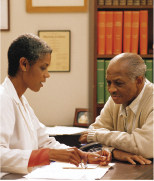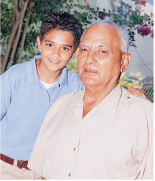Introduction
Many people take part in prevention studies.
People are asked to take or do something.
Most studies compare groups of people.
If you are thinking about joining a study, you will get a lot of information.
You have rights. They will be protected.
There are a lot of things to think about before you join a study.
The decision to join is up to you.
Here are some questions to ask your doctor or nurse.
You can find out more.
Introduction
You may be reading this because…
You want to learn about ways to:
- Lower your chances of getting cancer
- Help doctors learn more about preventing cancer.
This brochure tells you about taking part in a study that
may help find ways to prevent cancer.
A prevention trial is a research study.
A cancer prevention trial is a study of a large group of
people. A prevention trial tries to find better ways to
prevent people from getting cancer or lower the chances
that people will get it.
A prevention trial is different from a treatment trial.
A treatment trial finds better ways to treat cancer in people
who already have it.

|
"After my mother died
from breast cancer, I
wanted to do whatever I
could to keep from
getting cancer."
|
Back to Top
Many people take part in prevention studies.
Men and women of all ages and backgrounds take part in
these studies. Usually:
- They are healthy people.
- They are people who want to lower their chances for
getting a certain cancer.
Each study has different rules about who can join.
For example:
- One study may have people of a certain age or sex.
- One study may have people with a certain family history.
There are prevention studies for men and women of all
ages and backgrounds. You may know someone--a friend,
relative, neighbor, or co-worker--in a study now.

Back to Top
People are asked to take or do something.
In some studies, people are asked to do something
to lower cancer risk. For example:
- Exercise
- Follow a special diet.
In most studies, people are asked to take something
to lower cancer risk. For example:
- Take a medicine
- Take a vitamin.
When people are asked to take something,
it may be:
- The standard agent: A medicine or vitamin that is
already used to prevent a certain cancer
- The study agent: A new medicine or vitamin that
doctors hope will be better than what is already used to
prevent a certain cancer
- The placebo: A pill that has no medicine at all. It helps
doctors figure out whether or not the study agent really
works to prevent cancer.

Back to Top
Most studies compare groups of people.
People who join a study are placed in different groups.
Each group takes a different medicine or vitamin.
Each person has the same chance of being placed in
any of the groups.
- No one can pick the group he or she is in.
- No one knows which group he or she is
in--not even the doctors.
- This keeps the study fair, honest, and accurate.
Along the way, researchers will compare the groups to
find out if there were any differences. Then they will be
able to tell us which medicine or vitamin works the best to
prevent cancer. When researchers can tell what works best,
the study is over. If it is found to be unsafe, the study will
be stopped right away.

Back to Top
If you are thinking about joining a study, you will get a lot of information.
Study staff will talk with you.
Before you join a study, a doctor, nurse, or another person
who works on the study will tell you many things:
- Why the study is being done
- What will happen during the study
- What side effects you may have
- How the study may affect your daily life.
They will give you information in writing.
They will give you a consent form that tells you about the
study. If you decide to take part in the study, you will be
asked to sign the consent form. This means that you
understand the benefits and risks and you choose to join.
You can and should ask questions.
You should ask questions about anything you do not
understand.
You can change your mind and drop out.
Even if you sign the consent form, you can still change
your mind and stop at any time. Dropping out of a study
will not affect your health care in the future.
Back to Top
You have rights. They will be protected.
Groups of experts at the national and local levels approve
research studies before they begin.
- One of the most important groups is called an
institutional review board (IRB).
- The IRB's job is to review research studies to make sure
they are run safely and fairly.
- The IRB includes doctors, nurses, clergy, and people
from the community.
- Researchers may collect a lot of information about you.
But it will be kept as private and confidential as possible.
|
"I used to think that
people in medical
studies were just
'guinea pigs.' But I
found out it wasn't
like that. I felt that
my rights were
protected." |

|
Back to Top
There are a lot of things to think about before you join a study.
Benefits
- You will see a health care provider during the study. But
you should still see your own doctor for routine medical
care.
- You take an active role in your own future health.
- You may lower your chance of getting cancer.
- You will have the chance to help your children and
others who may get cancer in the future.
Risks
- The medicines or vitamins you take may have side
effects.
- The medicines or vitamins you take may not work as
well as proven ways to lower your chances of getting
cancer.
- You may not lower your chances of getting cancer.
Costs and Time
- Research studies have costs. And health insurance does
not always pay for all your costs in a study. So ask your
doctor, nurse, or social worker about these costs before
you decide to join.
- The study may take some of your time.
Back to Top
The decision to join is up to you.
- First, find out if there are studies that are right for you.
Ask your doctor or nurse.
- Then, think about why you may want to take part in
that study. Weigh this against why you may not want to
join.
- Be aware that choosing to take part in a cancer
prevention trial is just one way you can take care of your
health.
- Talk with your family, friends, and doctor. But YOU are
the one who should be happy with your final decision.

|
"I felt like what I was
doing could make a
difference in
someone's life
someday." |
Back to Top
Here are some questions to ask your doctor or nurse.
About Cancer Prevention Studies
- Is there a prevention study that I can participate in?
- Why is the study being done?
- What is the difference between the two groups in the
study?
- How long will the study last?
- How will I be told about the study results?
bout Benefits and Risks
- How can this study help me?
- What are the side effects of the medicines or vitamins
being used in the study?
About Protecting Your Rights
- How do I know this study is safe?
- How will my health be checked during the study?
- How will my health information be kept private?
About Deciding To Take Part
- What will I have to do if I take part?
- How could the study change what I do every day?
- Where will I have my medical exams?
- Will I be able to see my own doctor?
- What will I have to pay for if I take part in this trial?
- Will I be able to find out about the results?
Back to Top
You can find out more.
- If you have questions about cancer prevention trials, ask
your doctor, nurse, or other health care provider.
- To find out more about cancer prevention trials
in your area, ask your doctor.
or call:
National Cancer Institute
Cancer Information Service
1-800-4-CANCER (1-800-422-6237)
TTY (hearing impaired): 1-800-332-8615
or visit:
the Web at: www.cancer.gov

|
"I wanted to help myself
and other people, and
this study was right for
me." |
Back to Top
|